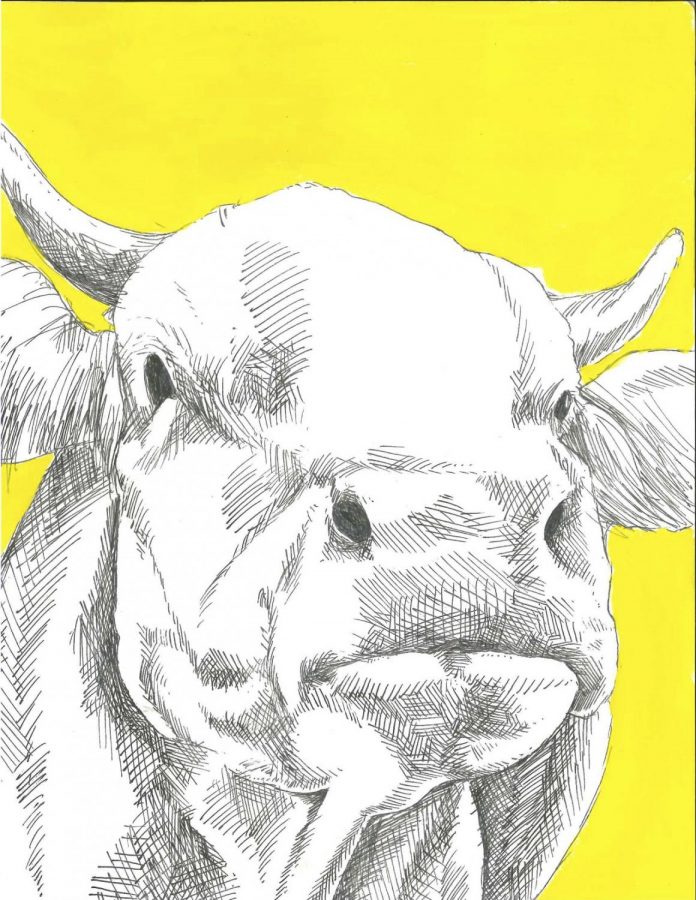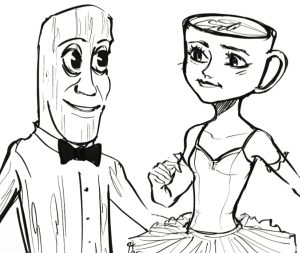Why You Shouldn’t Eat Beef
By Avoiding Beef, You’re Saving the Environment and Yourself
June 22, 2018
Doesn’t that burger look oh-so-much better than the meager grain bowl you know you should get? It does. We all know it. But what really goes into getting that burger in your hands? How many resources are sacrificed to give you that small satisfaction? The carbon footprint of a pound of beef is greater than that of a gallon of gasoline, according to National Geographic. In our little Cambridge bubble of overly-concerned composters and the liberalism of Democrats, it’s easy to get annoyed and block out all the chatter regarding our deteriorating Mother Earth, but this one’s important. For real.
“If the grain used to feed American cattle was used instead to directly feed humans, we would be able to feed 800 million people,” says David Pimentel of Cornell University. In the United States, 41 million people struggle with hunger. In fact, according to Cornell University, cows eat five times more grain than the entire American population. These statistics show that we have the tools to greatly reduce hunger in the United States—all we have to do is stop eating beef. But that’s just food; what about water? The Huffington Post writes that it takes an astounding 1,847 gallons of water per pound of meat to produce beef. To put things in perspective, it takes only 518 gallons per pound to produce chicken; in other words, 28% of what beef uses. You might think that if cattle use so much energy, they might give us more, but that’s not how it works. Pimentel states that for every 54 calories consumed by a cow, they produce only one calorie for us to eat. Cows use up an incredible amount of resources, which makes them an inefficient and environmentally harmful food source, but they also give off a lot of methane. American cattle produce 5.5 million tons of methane per year, according to University of Colorado Boulder. The methane enters the atmosphere when cows burp, fart, poop, or when they are slaughtered. An article in the Independent claims that methane is 20 times more harmful than carbon dioxide. Gassy livestock now causes an astonishing 39% of global greenhouse gas emissions, reports NPR, and this is a growing problem—in 2006, cows only caused 18% of global greenhouse gas emissions.
Eating beef has a powerful adverse effect on the environment, but it also harms your health.
Studies at Harvard Medical School suggest that people who don’t eat beef generally have a lower body fat percentage and a decreased risk of heart disease and diabetes (they also spend way less on food, because plants are cheaper!). Additionally, cows are often fed high-fructose corn syrup so they put on weight faster, but guess where that nasty sugary ingredient winds up? Right in our own bodies, causing us to gain weight too.
Still want that burger? According to the American Society for the Prevention of Cruelty to Animals (ASPCA), “Over 99% of farm animals in the U.S. are raised in factory farms, which focus on profit and efficiency at the expense of animal welfare.” Cattle are often branded (the burning of a mark into skin with a hot piece of iron) and separated from their mothers at extremely young ages. Cows, like humans, form strong friendships and have best friends they like to spend most of their time with, according to a study at Northampton University. Cattle are unable to choose their company at factory farms, often living in overcrowded feedlots with hundreds or even thousands of other cows. These factory farms are often run by very few employees who do not get paid enough, and who do not have the time to take proper care of the cows. For this reason, the feedlots are often unsheltered and uncleaned, meaning cows have to stand knee-deep in their own manure during blizzards or heat waves and everything in between, says the ASPCA. When it comes time for cows to be slaughtered, they endure even worse conditions than they have had to deal with their whole lives. Cows are often denied food for several days while crammed into trucks on the way to slaughterhouses. Once at the slaughterhouse, cows often wait their turn for up to two days, watching their companions die, smelling blood, and hearing screams of pain (as reported by Animal Equality). This might sound a little graphic, or maybe you think I’m personifying cows and being super extra, but I’m not. This stuff really happens. Every single day.
By choosing to stop eating beef, you would be doing a favor to the Earth, the cows, and yourself. The immense negative effects of beef consumption have been laid out before you. Now it’s up to you to make a decision … what will you do?
Note: If cutting beef out of your diet is not possible for you and your family, you can still try to limit it, and try to buy beef with labels such as Certified Humane, Global Animal Partnership, American Humane Certified, Animal Welfare Approved, or American Grassfed, which require certain standards of humane treatment for cattle.











